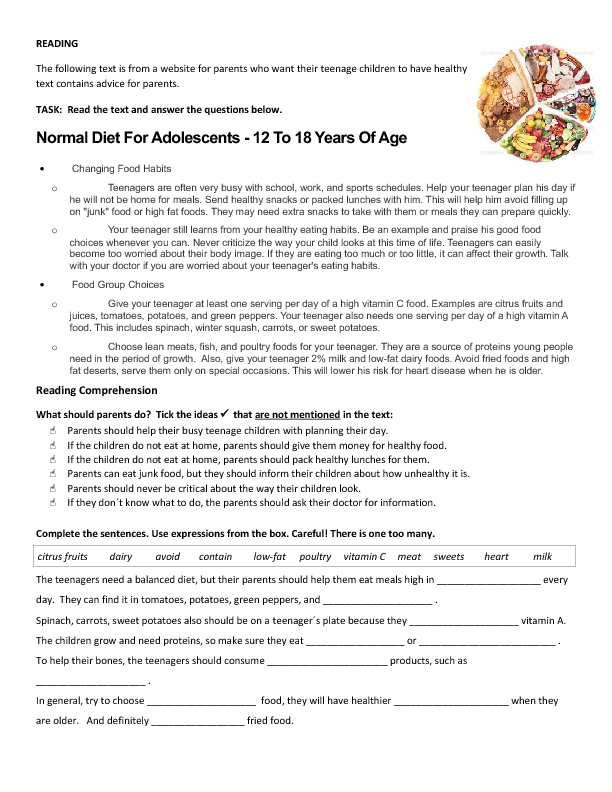
Teenagers are very busy. Teenagers tend to place more importance on dating and socializing than on basic health and nutrition. These are crucial for their mental, physical, and spiritual health. Listed below are some healthy living tips for teenagers that will help them achieve these goals. Your teen should get plenty of sleep and be able to spend time with his friends. Healthy living tips to teens will help them feel happy and prevent them developing unhealthy habits.
Limit screen time to two hours per day
It is often recommended that parents limit the time their children spend on screens. You should consider many factors when making such an important decision. In addition to age and activity level, it is also important to consider whether the time spent using screens is limiting their children's social and academic development. In 2016, the American Academy of Pediatrics issued updated guidelines on screen time. They suggest that children and teenagers limit the amount of screen time they spend on TV or other screens.
Keep your social media active
Your daily parenting routine should include a focus on monitoring your teen's social media networks. Keep an eye on your teen's social media accounts and make sure you are their first friend. This will allow you to build a rapport with your teen as well as learn about any potential dangers that they might be experiencing. Teenagers are not allowed to post personal information, especially on social media.

Get enough sleep
Many teenagers feel they don't get enough rest. Teenagers need more sleep as their bodies grow rapidly. They also need to unwind. Here are some tips to help your teenager sleep eight hours a night. To reduce the possibility of dramatic shifts in their schedules, teenagers should aim to wake up around the same hour each morning. You may give your teenager some extra time during the weekend if they are having trouble getting up at the right time.
Enjoy fresh food
Teenagers need to eat at most 3 meals per day. Avoid diet foods that require cutting out entire food groups. Fad diets may not provide adequate nutrition. Your teen could be lacking in vitamins or minerals. A healthy lifestyle is key to keeping your teen on the right path. Get plenty of vegetables and fruits, and reduce sugary drinks. Avoid snacking at night and make fresh fruits and vegetables your mainstay for after-school snacks.
Hydration is key
Keeping hydrated is essential for your child's health and well-being, and a good habit to teach them at an early age. Water is good for your child's overall health and well-being. It also keeps them awake and alert. It is refreshing to drink cool beverages such as water and sports drinks on a hot day. Make sure to keep them hydrated by making water easily available and offering frequent breaks.

FAQ
Is there something wrong with me if I'm depressed?
Depression is a very common problem for teens. Yet, depression is common among teenagers.
This doesn’t mean you’re insane or weak. Many people are unaware that they are suffering from depression. Depression can be a medical condition.
There are many types of depression. Some people feel only sadness. Others experience other emotions. There are different degrees of severity.
Some people suffer mild depression, others are more severe. It is important to remember that not all depression is bad. Sometimes, it helps us deal with stressful situations.
However, if you find yourself feeling demotivated or sad all the time, you should consult your doctor. Your doctor will be able to diagnose you and determine if you need treatment.
Are mental health and work more important than mental health?
Everybody needs to be healthy, especially when they are working. Relaxing at work can make you feel more relaxed. You might try going out with friends or taking a walk outside.
You should speak to your boss if you are struggling with relaxation. You may find solutions to your stress through them.
You should also take care of your physical well-being as well. It's important to eat right, exercise regularly, take enough rest, and get plenty of sleep.
What can you do if you are experiencing mental health issues
When you have any kind of mental health problem, it's important to seek treatment. You may have been subjected to trauma or abuse. It is possible that your thoughts about yourself have been affected by this.
You may also be suffering from an eating disorder, addiction, or another type of mental illness. These disorders can cause significant damage to your personal and professional life.
You shouldn't try to deal with them on your own. Talk to someone who has experience with these issues. Professional therapists can help you overcome these obstacles.
Statistics
- More than 40 million adults in the United States have an anxiety disorder, but less than 37% of people seek mental health treatment for their symptoms. (talkspace.com)
- Appropriate nutrition and exercise are likely among the most efficacious and cost-effective positive mental health interventions. (ncbi.nlm.nih.gov)
- Neuropsychiatric diseases are the leading cause of death and disability in the U.S., accounting for 18.7 percent of all years of potential lifespan loss and premature mortality.
- It does have some influence, but not nearly as much as we might think, so focusing less on attaining wealth will likely make you happier (Aknin, Norton, & Dunn, 2009); (positivepsychology.com)
- According to the National Alliance of Mental Illness (NAMI), one in five Americans experiences mental health issues which translates to more than 40 million adults a year. (doctorondemand.com)
External Links
How To
How To Determine If One Needs To Ask For Help From A Mental Health Expert
To determine whether you need to seek professional assistance, some signs should alert you to the possibility that your problem might require professional attention. If you notice any warning signs, it's best to consult a doctor.
-
You feel like you're losing control of yourself.
-
You have trouble sleeping.
-
When you try to focus, your thoughts race.
-
You begin to consider suicide.
-
You feel hopeless.
-
It's as if life is too hard.
-
You have lost interest and are no longer interested in the things you loved.
-
You have stopped eating.
-
You have been removed.
-
You may have used drugs or alcohol to manage stress.
-
You are starting to lose family or friends.
-
Other symptoms may include stomachaches, backaches or headaches.
If you have any of these symptoms, it is important to immediately see a doctor.